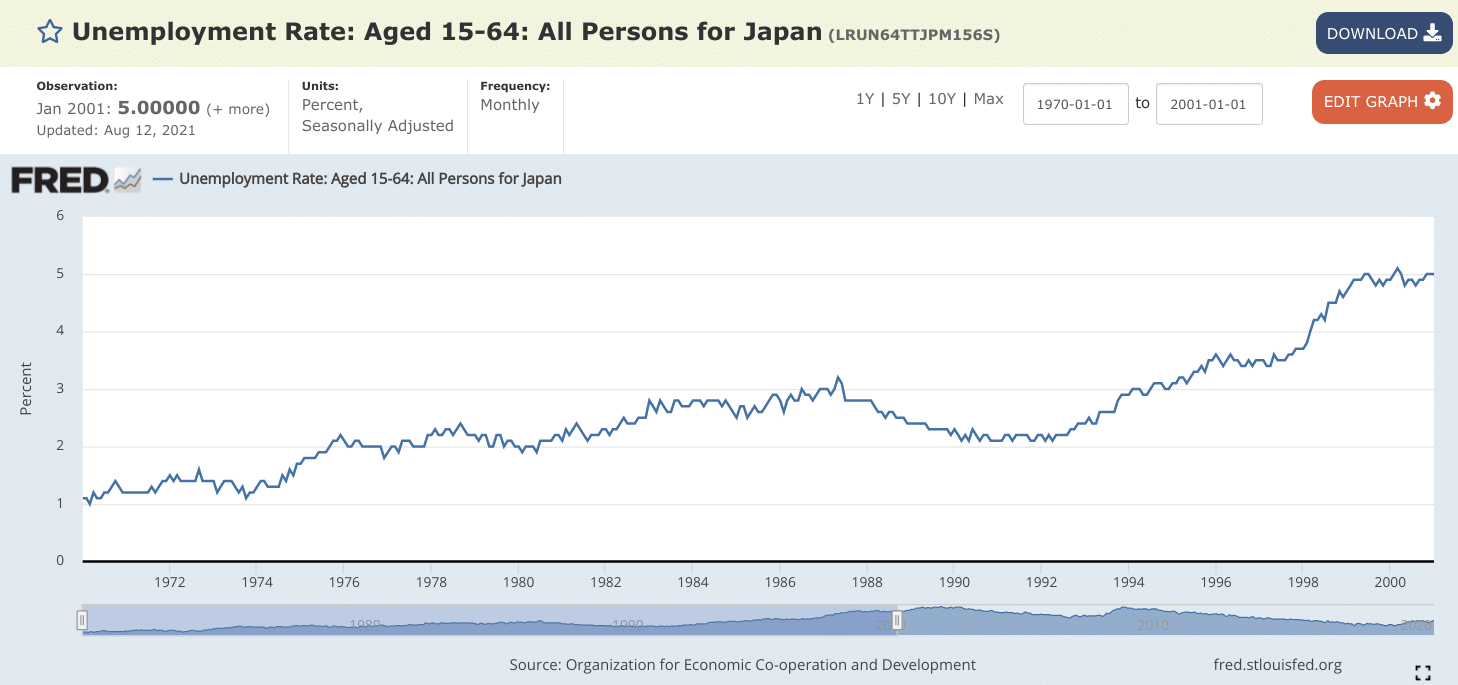
In its nearly 250-year history, the U.S. has experienced more periods of inflation than deflation. The last big period of deflation occurred during The Great Depression.
There was another smaller period during the Great Financial Crisis. Both coincided with a recession. During a recession and deflation, people lose their jobs, demand drops, and with it, prices.
But for those who are able to hang on to their jobs and have investments, what should they look at for some of the best investments during a deflationary period? In this article, we'll explain how deflation works and offer a few strategies for defending against it.
What Is Deflation?
Whereas inflation is an increase in prices, deflation is a decrease in prices.
As mentioned in the introduction, deflation usually occurs during a recession. As layoffs begin, demand starts dropping. That results in companies lowering prices in an attempt to attract customers. But due to their suppressed prices and profits, companies are also more prone to reduce their wages or lay off even more employees.
Even though products are more affordable, if customers are making less money or don’t have jobs at all, they can't buy like they used to. So sales stay depressed or may even decline further.
The above scenario can create a viscous supply and demand cycle. As companies lower prices, their profit margins compress. This leads to the need to reduce cost, which leads to more layoffs. But more layoffs further decrease demand, fueling the cycle.
Japan's "Lost Decade" from 1990 to 2001 is perhaps the most well-known example of how deflation can decimate an economy. The graph below from the Federal Reserve Economic Data (FRED) shows the steady climb of Japanese unemployment during those difficult years.

Should U.S. Investors Be Worried About Future Deflation?
Deflation isn't a problem right now in the United States. In fact, the Federal Reserve has been more focused lately on containing inflation problems that have been brought on by pandemic-related supply chain issues in several industries.
Related: These Are The Best Investments For Inflationary Periods
But some economists are concerned that when those supply issues are resolved, demand may still not return to pre-pandemic levels. Unemployment and consumer fear are two of the biggest factors that lead to deflation. And both could remain high even after companies are back to producing at full capacity.
There's still a strong chance that the United States could steer clear of deflation. And the Federal Reserve will certainly take every action that it can to make sure that happens. Still, it's a potential threat that investors will want to keep an eye on over the next three to five years.
3 Best Investments For Deflationary Periods
For many, deflationary periods are marked by conservation and even survival. But for some, they're able to maintain their investments and continue without a significant decrease in their lifestyle.
Deflation may sound like a great time for investors because prices are falling. But the problem is that prices can keep falling. There's no way to know for sure when the bottom has been reached.
Rather than chasing prices lower, it may be better to look at investments that maintain their value or at least don't drop as fast. Below are three examples of investments that tend to remain durable during deflationary periods.
1. Investment-Grade Bonds
Investment-grade bonds include Treasuries and those of high-quality, blue-chip companies. These types of bonds work well during a deflationary environment because of the quality of the entity behind them.
The government isn’t going broke, which means investors can have confidence that they’ll continue to receive regular payments and eventually their principal.
It’s the same with high-quality companies. These companies have been around for a long time, have great management and solid balance sheets. Their products are in demand. It’s unlikely these companies will go out of business, even during a recession.
Want To Learn How To Build A Diversified Bond Portfolio?
2. Defensive Stocks
Defensive stocks are those of companies that sell products or services that we people can't easily cut out of their lives. Consumer goods and utilities are two of the most common examples.
Think of toilet paper, food, and electricity. No matter what the economic conditions are, people will always need these goods and services.
If you don't want to invest in individual stocks, you could invest in ETFs that track the Dow Jones U.S. Consumer Goods Index or the Dow Jones U.S. Utilities Index.
For consumer goods, popular ETFs include iShares US Consumer Goods (IYK) and ProShares Ultra Consumer Goods (UGE). And ETF options for utilities include iShares US Utilities (IDU) and ProShares Ultra Utilities (UPW).
3. Dividend-Paying Stocks
Dividend-paying stocks remain in demand during a recession because of their income. While the stock price may decline, investors can count on the dividends to continue providing steady passive income.
Investors should focus on high-quality dividend-paying companies, rather than simply seeking companies that have high dividend yields. An abnormally-high dividend yield may actually be a warning sign because it could indicate that the stock's price has recently taken a nosedive.
If you're looking for strong, dividend-paying companies, the "Dividend Aristocrats" can be a great place to start. Dividend aristocrats are companies that have increased their dividends for at least 25 consecutive years. As of September 2021, there are 63 companies that meet these requirements.
Want To Start Investing In The Dividend Aristocrats?
3 Other Ways To Defend Against Deflation
Investments aren’t the only way to make it through a deflationary event. People who can’t invest can make things a little easier on themselves by following two key strategies:
1. Build Cash Reserves
Holding cash should rank high on the list during a deflationary period. This is because cash will have more buying power as prices drop. Deflation is a contraction of the money supply and credit. That increases the dollar’s value.
For anyone who has tried to get a loan during a recession, they know it can be very difficult. That makes keeping your emergency fund fully-funded all the more important. And you may want to save up even more cash if you know you have a large expense coming soon.
Are You Earning Enough Interest On Your Savings?
2. Hold Liquid Assets
Holding liquid assets like certificates of deposits (CDs) or money market accounts (MMAs) is also important since investors can easily convert them into cash.
Yes, liquid assets will lose value as well during deflation. But unlike illiquid assets such as real estate, cars, and collectibles, liquid assets can quickly become a source of cash during an emergency.
3. Pay Down Debt
Debt does not decrease in value due to deflation. In fact, it often only becomes more of a burden during deflationary periods.
Wages typically stagnate or fall during deflation while debt amounts either stay the same or grow due to accumulated interest charges. And consider if someone loses their job and has to go on unemployment during a deflation cycle. Their income will be much lower while their debt load remains the same.
We’d say that reducing debt is just about always a great strategy no matter the economic environment. But it's especially a smart idea during a deflationary environment.
Final Thoughts
For many, deflation means pulling in the reins and battening down the hatches. And that's ok when it means cutting out unnecessary expenses. But investing for your retirement and future goals aren't things that you should cut off of your budget during deflation if you can possibly help it.
If you continue to invest throughout the downturn, you'll be in even better shape when prices rebound. In the meantime, knowing what works and what doesn’t can be the difference between maintaining a certain level of stability across your investments vs. watching them completely crash and burn.

Robert Farrington is America’s Millennial Money Expert® and America’s Student Loan Debt Expert™, and the founder of The College Investor, a personal finance site dedicated to helping millennials escape student loan debt to start investing and building wealth for the future. You can learn more about him on the About Page or on his personal site RobertFarrington.com.
He regularly writes about investing, student loan debt, and general personal finance topics geared toward anyone wanting to earn more, get out of debt, and start building wealth for the future.
He has been quoted in major publications, including the New York Times, Wall Street Journal, Washington Post, ABC, NBC, Today, and more. He is also a regular contributor to Forbes.
Editor: Clint Proctor Reviewed by: Ashley Barnett
